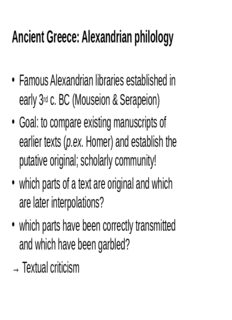
Ancient Greece: Alexandrian philology PDF
Preview Ancient Greece: Alexandrian philology
Ancient Greece: Alexandrian philology • Famous Alexandrian libraries established in early 3 c. BC (Mouseion & Serapeion) rd • Goal: to compare existing manuscripts of earlier texts (p.ex. Homer) and establish the putative original; scholarly community! • which parts of a text are original and which are later interpolations? • which parts have been correctly transmitted and which have been garbled? → Textual criticism Ancient Greece: Alexandrian philology • Standardisation of alphabet • Introduction of punctuation and accent marks Ancient Greece: Alexandrian philology Ancient Greece: Alexandrian philology • Standardisation of alphabet • Introduction of punctuation and accent marks • Symbols to indicate problems in text • Commentaries on text • Scholarly discussions of issues like the identity of Homer (not much remains) • Glossaries of difficult words (archaic, dialectal) • Notes on points of morphology • Standardised "editions" of important texts Ancient Greece: Alexandrian philology Dionysios Thrax (~100 BC): "Grammar is the practical study of the normal usage of poets and prose writers. It has six parts." • competence in reading aloud observing prosody • interpretation with attention to figures of speech • explanation of difficult words and allusions • investigation of the true meaning (etymologia) of words (probably Plato-like) • analysis of analogy (probably morphology) • criticism of poems, the finest branch of subject Ancient Greece: Alexandrian philology • basically textual criticism, closer to literary studies than to anything else • philology in 19 century European sense th • grammar an ancillary discipline (though, of course, branches of science were not yet compartmentalised) • seminal work, very important for future of humanities as academic disciplines and of European culture in general Ancient Greece: Summary • Philosophical interest: language and reality / truth / knowledge – meaning, syllogisms, sentence types • Plato, Aristotle, Stoics • Practical interest: effective use of language – rhetoric, poetry, style, metaphor • Sophists, Aristotle, rhetoricians • Philological interest: language as the raw material of poetry & prose – spelling, punctuation, morphology • Alexandrian scholars (Aristophanes, Zenodotos...) Rome: Grammar as a discipline Patterned entirely on Greek models But develops in new direction: school grammar, organised in a methodical way Language seen "from outside" (learning Greek!) Almost nothing remains from the crucial period (1 –2 c. BC) st nd Twenty-odd grammars from 3 –5 c. AD rd th Plus: Varro’s De lingua latina (1 c. BC) and st Quintilian’s Institutio oratoria (1 c. AD) st Also Greek grammars in a similar tradition Rome: M. T. Varro’s De lingua latina • One of the greatest scholars of Antiquity • Lengthy treatise, only 6 books out of 25 remain, in a single corrupt manuscript • Unlike anything else on language! • Philosophically grounded discussion of grammar and vocabulary; general principles (we would now call it theoretical linguistics) • Analogy vs. anomaly (~ inflectional vs. derivational morphology ― outstanding!) Rome: Quintilian’s Institutio oratoria • ~ Training of the public speaker • Includes discussion of what is / should be taught to children • One of the most important things: grammar ― why?
Description: